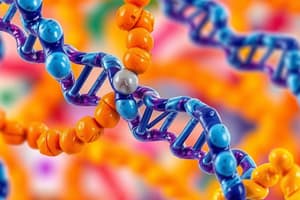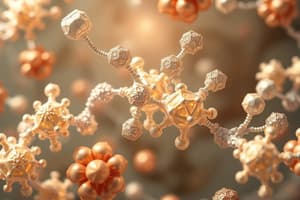Podcast
Questions and Answers
What type of reactions involve the formation of a double bond when atoms are removed from a molecule?
What type of reactions involve the formation of a double bond when atoms are removed from a molecule?
- Oxidation-Reduction reactions
- Nucleophilic substitution reactions
- Isomerization reactions (correct)
- Addition reactions
Which type of reactions involve two molecules combining to form a single product?
Which type of reactions involve two molecules combining to form a single product?
- Nucleophilic substitution reactions
- Oxidation-Reduction reactions
- Elimination reactions
- Addition reactions (correct)
What are anions or neutral species possessing nonbonding electron pairs called?
What are anions or neutral species possessing nonbonding electron pairs called?
- Isomers
- Electrophiles
- Redox agents
- Nucleophiles (correct)
Which reactions involve the transfer of electrons and energy, leading to the gaining or losing of electrons?
Which reactions involve the transfer of electrons and energy, leading to the gaining or losing of electrons?
In which type of reaction is one atom or group substituted by another?
In which type of reaction is one atom or group substituted by another?
What is formed in elimination reactions?
What is formed in elimination reactions?
What is the role of electrophiles?
What is the role of electrophiles?
In oxidation-reduction reactions, what happens to reducing agents?
In oxidation-reduction reactions, what happens to reducing agents?
What type of reaction forms a double bond by removing atoms in a molecule?
What type of reaction forms a double bond by removing atoms in a molecule?
What is the main reason why lipids are not considered polymers?
What is the main reason why lipids are not considered polymers?
What defines addition reactions?
What defines addition reactions?
What type of bond is a peptide bond?
What type of bond is a peptide bond?
Which type of reaction involves the reversible interconversion of aldose and ketose isomers?
Which type of reaction involves the reversible interconversion of aldose and ketose isomers?
What role do carbohydrates play in living organisms?
What role do carbohydrates play in living organisms?
Why are unsaturated fatty acids liquid at room temperature?
Why are unsaturated fatty acids liquid at room temperature?
What characterizes hydration as a reaction?
What characterizes hydration as a reaction?
Which term describes the type of bonds formed between amino acids in a protein?
Which term describes the type of bonds formed between amino acids in a protein?
What happens in a nucleophilic substitution reaction involving amino acids?
What happens in a nucleophilic substitution reaction involving amino acids?
Flashcards are hidden until you start studying
Study Notes
Biomolecules
- Monomers are the building blocks of biological macromolecules
- Examples of biomolecules include carbohydrates, proteins, and lipids
- Lipids are macromolecules but not polymers, as they are composed of different units (glycerol and fatty acids)
Carbohydrates
- Made up of monosaccharides, such as glucose
- Examples of polysaccharides include cellulose and chitin
- Functions of carbohydrates include storing energy and serving as structural materials
Proteins
- Made up of amino acids
- Peptide bonds are amide linkages formed through nucleophilic substitution reactions
- Amino acids have hydrophobic and hydrophilic regions, with a central carbon bonded to an amino group, carboxyl group, and side chain
- Peptide bonds release water (H2O) during formation
Lipids
- Include fatty acids, such as oleic acid (unsaturated)
- Phosphate groups are present in nucleic acids
Reactions in Biological Systems
- Nucleophilic substitution reactions: involve the substitution of one atom or group for another
- Elimination reactions: involve the formation of a double bond through the removal of atoms or groups
- Addition reactions: involve the combination of two molecules to form a single product
- Isomerization reactions: involve intramolecular shifts of atoms or groups
- Oxidation-Reduction (Redox) reactions: involve the transfer of electrons from a donor (reducing agent) to an electron acceptor (oxidizing agent)
Enzymes
- Biological molecules that facilitate chemical reactions
- Involved in various cellular processes, including metabolism and energy production
Studying That Suits You
Use AI to generate personalized quizzes and flashcards to suit your learning preferences.




